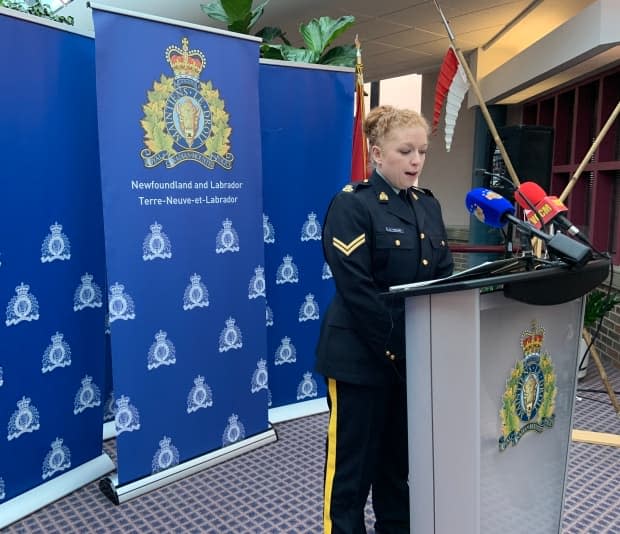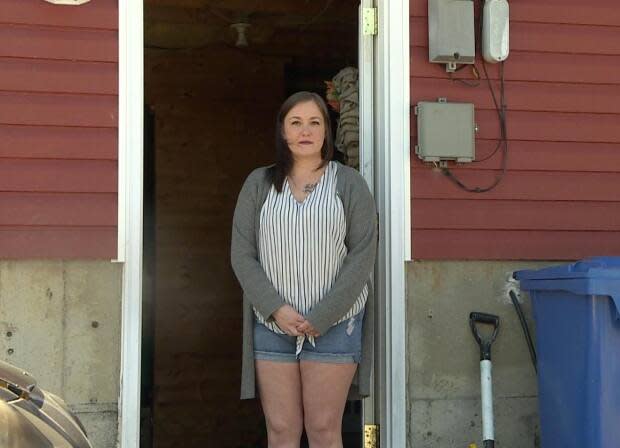RCMP has more explaining to do about entering Mount Moriah home, says former Mountie


A former Royal Canadian Mounted Police officer and a constitutional law professor say police officers have more explaining to do about a warrantless entry of a western Newfoundland home in June.
According to the RCMP, the officers who entered the Mount Moriah home, looking for a teenage girl who had been reported missing, were legally able to do so under exigent circumstances.
But Bruce Pitt-Payne, who was an RCMP officer for 26 years, says the force hasn't demonstrated that the situation met the definition of "exigent circumstances" — which has specific criteria.
"It's a high standard, a high burden to prove. You can't just say, 'Well, we felt it was necessary or it was exigent.' You have to articulate that," Pitt-Payne said Thursday. "I'm not saying the police didn't have that. I'm saying that nobody's articulating that to us."
Cortney Pike says she woke around 5:30 a.m. on June 5, to find two RCMP officers in her home. The officers had entered the house without permission and already gone into her 11-year-old daughter's bedroom, shining a light in her face and questioning her about a missing 17-year-old girl.
The missing girl was not inside the home, and Pike has repeatedly said her family doesn't know her.
Pitt-Payne said the warrantless entry could have resulted in a more dangerous — and potentially fatal — situation.
"The police officers could have been hit with something. They could have been shot," he said. "They might have a startled homeowner jump out with a weapon and get shot by the police."
Last week, Pike said she's lodged formal complaints with both the RCMP and the the provincial Serious Incident Response Team, a civilian-led oversight agency.
'Imminent danger'
At a news conference on June 10, RCMP spokesperson Cpl. Jolene Garland told reporters the two officers who entered the home believed the missing girl was inside the home and in immediate danger — but she wasn't able to say what that danger was.
"I don't have the specific level of harm other than to what was communicated to the RCMP by the complainant, was that the youth expressed interests of concern of wanting to come home," she said. "There was concerns for her safety at that point in time."

Pitt-Payne said if the officers entered the home under exigent circumstances, the RCMP should be able to define what danger the girl was facing.
"Just being a runaway does not give you exigent circumstances," he said.
Garland said the officers said they attempted to alert the occupants by knocking on doors and windows and yelling for 45 minutes, and then spent another 15 minutes banging on an oil tank located inside an unlocked door. Pike said she didn't hear the officers until they were already inside the home.
But Pitt-Payne said the length of time the officers spent trying to alert the people living in the home also contradicts the defence of "exigent circumstances."
"What the police are saying is 'exigent, but not exigent enough that we went and kicked the door in.'"
Benoît Pelletier, a constitutional law professor at the University of Ottawa, said under Canadian law, exigent circumstances exist when there is imminent danger of injury or death. They also can exist if there is imminent danger of a suspect escaping or the destruction of evidence.
"The key words are 'imminent danger,'" he said.

Pelletier said police should judge that danger based on the facts as they know them.
"This is an onus that is strong, I would say heavy, on the shoulders of the police officers."
"It's also the facts as they are estimated or evaluated by a prudent and a reasonable person," he said.
Right and wrong
Based on what he's read about the incident, Pelletier said, he believes the officers acted appropriately; however, he said the officer's actions should be scrutinized.
"There must be a close examination of the situation or the facts that are, in fact, invoked by the police officers in order to see who is right and is wrong," he said.
Though he believes the officers' actions were justified, Pelletier said the warrantless entry was still a denial of the rights of the family that lives in the home.
"We have the right to live peacefully in our house and not to, in fact, be afraid of policemen entering the place without a warrant."

Garland said senior management reviewed the case and found the two officers acted appropriately; however, she said the RCMP didn't interview or speak with the family who lives in the home as part of the review.
Pitt-Payne said that's a problem.
"How can you investigate whether something was done correctly or lawfully when you haven't even spoken to the homeowners yet?" he asked.
Pitt-Payne is calling for another review — by an agency like SIRT-N.L. — to provide more clarity for the officers' actions and reasons for entering the home..
"It's the lack of what is being said that is screaming at the loudest volume," he said.

 Yahoo Movies
Yahoo Movies 
